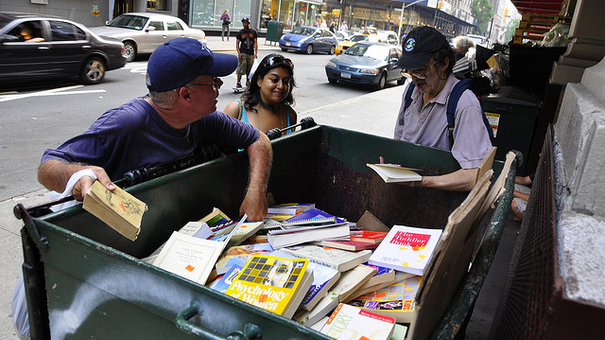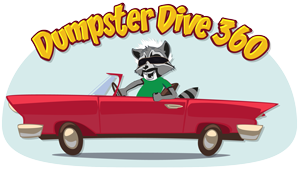
The idea of dumpster-diving seems to push the limits of even the most frugal among us. Visions come to mind of foraging in muck, half-disguised out of fear being spotted by a neighbor.
1. Determine Your Territory
Selection varies widely between residential and commercial dumpsters. If you focus on commercial areas, look for businesses that sell what you might be interested in and have high product turnover. Because most businesses consider diving a threat to customer privacy and future profits, commercial dumpsters are often secured and items in them damaged or destroyed to prevent reselling. Tread carefully in these areas. I’ve found residential diving to be best around large apartment buildings in established neighborhoods where tenant turnover is consistent and moving budgets modest. Usually apartment dwellers don’t have much storage space or areas to host yard sales, so excess items end up on the street or in the dumpster.
2. Timing Is Everything
When I lived in Chicago, October and May were always the prime picking months. Old apartment leases ending and new ones beginning create a glut of items weeded out in the transition. During these months, the alleyways in Chicago were veritable shopping aisles full of chairs, air conditioners, lamps, dishes, books, and clothes just waiting for an open trunk. In other neighborhoods, look for estate sales and yard sales — the evening after one of these events usually finds most unsold items relegated to the curb.
3. Courtesy Counts
Diving is a community activity and its devotees come from all walks of life. I never forget that what is an eccentric hobby for me may be the sole means of support for someone else. Courtesy is key — not only for the property owner, but for the next diver. Leave the spot better than you found it; items strewn about only create a hazard for cars, give diving a bad name and show lack of consideration for the next guy. If a spot is particularly good, some divers flag it by setting something on top of the dumpster to differentiate it from the rest. Little acts of forethought and kindness are important to divers too.
4. Select and Reject
Not all objects survive house-to-curb equally well and I’m not above the ‘gross factor’ when it comes to certain items. My personal rule has always been to avoid anything that can’t be washed or disinfected easily. Upholstered furniture, mattresses, and some clothing immediately fall within my “no thanks” category. A thorough look-over and quick smell test can usually tell you all you need know. Remember, knowing what to reject is just as important as knowing what to grab.
5. Take Only What You Need
In large urban areas or college towns the fruits of diving can be so great that you’ll need to exercise a bit of restraint. Diving should be a way of reducing expenses, not adding to them with storage costs. There’s more than enough to go around; leave something for next guy.
6. Safety, Gear and the Law
Items relegated to the garbage are typically considered part of the public domain, but this can vary by municipality. Respect local ordinances and private property boundaries and never jeopardize your safety. If you’re diving at night, go with a buddy or small group of friends.< There’s always safety (and a bit more fun) in numbers. Likewise, proper gear is essential to safe diving: a small LED flashlight helps when diving at night and a pair of form-fitting rubberized gardening gloves will protect your hands from broken glass. Anti-bacterial hand sanitizer provides a little peace-of-mind in between pit stops too. Toss a plastic or nylon tarp in your trunk — it comes in handy when you need to protect your car’s upholstery from heavy, sharp or particularly grimy items.
Granted, dumpster diving may be an acquired taste. The psychological leap in retrieving something from the trash and making it part of your home is too great for some folks to make. But in a world filled with excess, with entire islands of garbage floating in our oceans and more new ‘stuff’ being cranked out every day, diving is the ultimate green activity. It’s recycling at its most primary — giving another life to an existing object without the need of secondary recycling and remanufacture. Once you’re bitten by a great find and the rush of that $0.00 price tag, you may never look back.
This dumpster find was submitted by Nancy Bellwood. Thanks so much for sharing what you found!








Reader Interactions